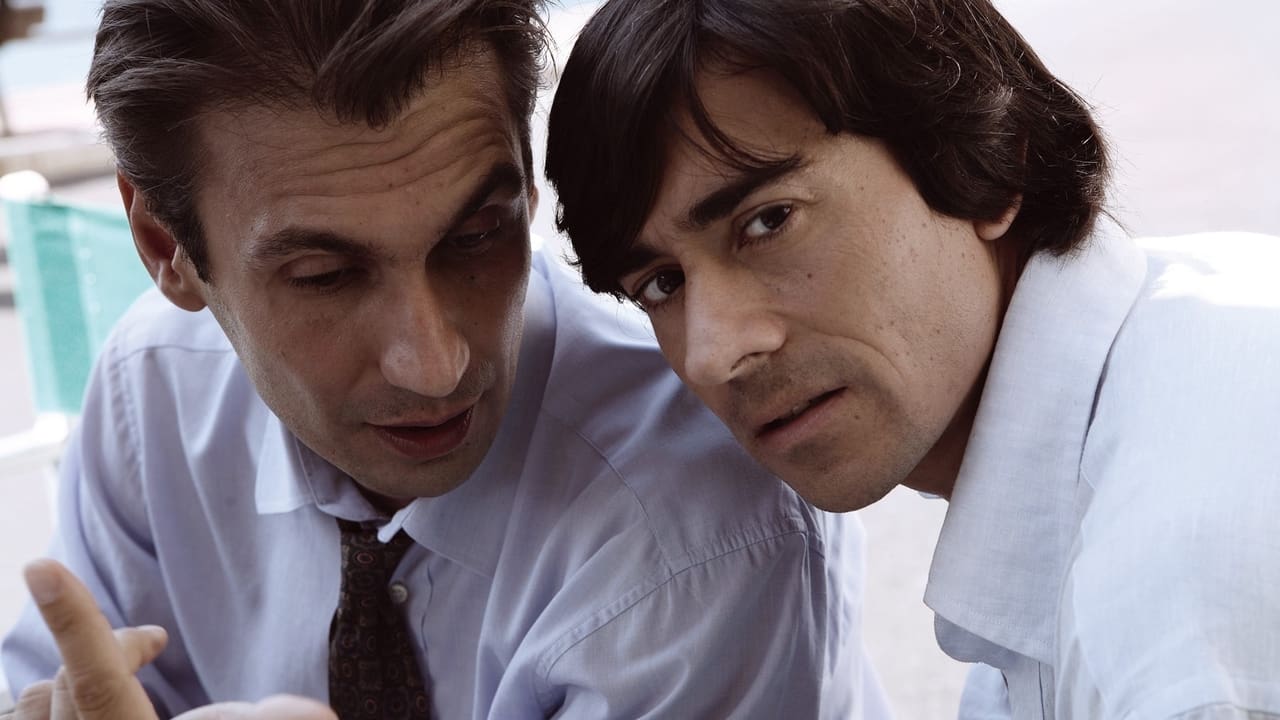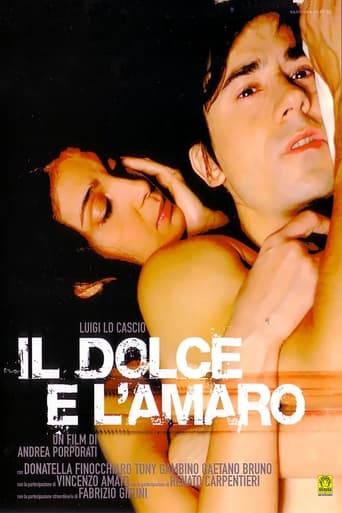

It would make sense that the writer behind Gianni Amelio's Lamerica would have a grip on some of the deepest and most mythical aspects of the Italian experience. And here in 'The Sweet and the Bitter'/'Il dolce e l'amaro' Andrea Porporati grabs something killer: the composite life of a humble soldier of the Mafia who eventually became one of the many "pentiti," the turncoats who turned state's evidence and were put into protection after a life of being told what to do and how to think, pretending to be big and really being nothing. That's how Saro (Luigi LoCascio) describes himself toward the end of this eventful 98-minute film. We're tired of hearing about the Mafia, some American viewers may say. Yes, and nobody is more tired of hearing about the Mafia than the Italians. Unfortunately, despite thousands of "pentiti" and the martyrdom of brave judges who dared put mafiosi away, the Cosa Nostra is still very much around. This is not as good a story as 'Lamerica,' and Porporati is not as good a director as Gianni Ameli, but this is a cracking good story and this is not just another Mafia story, even if in melding his composite of three "pentiti" tales he's occasionally forged outcomes and relationships that are a little bit too neat. In movies, neatness works. Even events that at least in retrospect may seem breathtakingly obvious, in the rich mise-en-scène of a well-made Italian film they can make you gasp with a mixture of horror and pleasure.In an opening scene, a man and a boy take a leak out in a vast landscape. It's Sicily. The man tells the boy to look up at the beautiful moon. But I see the sun, the boy says. Look again, says the man. Oh, yes, the boy says. I see the moon. Why do you see the moon now? the man asks. Before, says the boy, I was looking through my own eyes, but now I am looking through your eyes. That's the way I want you to be, says the man. Thus the Mafia tutors its future servants. A wonderful scene, as funny as it is chilling.Poporati has style. The art direction and cinematography are excellent here. Most importantly, one scene after another grabs you. Yes, it's violent. But this is an organization that lives by violence. Early in life, Saro is sent into a Sicilian prison to negotiate with his father, a Mafia lieutenant who's leading a revolt. His father is a good lieutenant and he will not negotiate. That's the last Saro sees of his father: the revolting prisoners are all shot. Saro is raised by his godfather, Don Gaetano, whose son Mimmo (Gaetano Bruno) is an obvious coward who clutches up at a key moment.Saro loves Ada (Donatella Finocchiaro), the local (figurative) princess, and Ada loves Saro, but she will not marry him because he's a criminal. She prefers Stefano (Fabrizio Gifuni), whom Saro beats up, but who stoically resists, earning Saro's respect. The flame continues to burn for a long time and is renewed years later after Ada has long moved to the north of Italy. Stevano renounces everything and studies the law. The next time Saro sees him he's become a magistrate. Mimmo and Saro are initiated into the "Men of Honor" of the Mafia for a double hit in which Mimmo has clutched but Saro has covered for him. The debts and resentments are already deep.Saro marries the girl he's told to marry and has two kids and lives in a nice apartment full of art with a large balcony. He's the envy of many. But life is full of the desperate betrayals and impossible demands of the criminal organization. Saro is ordered to kill none other than Stefano (whom he respects and who has already done him favors). But before that he is betrayed by his boss and the devious Mimmo so he's ordered to kill his own godfather, and because he cannot follow through on that he is forced to flee to the north of Italy, leaving behind his wife and kids--but finding Ada. I won't tell you any more, only that the final scene of hilarity during a bank robbery (rhyming with an earlier uproarious scene) made me weep with pleasure. Porporati wields one last scenic coup.Subtitles are handy in this one, since most of the dialog is in Sicilian dialect; most of the main actors, except for Fabrizio Gifuni, are native Sicilians. The casting of Luigi Lo Cascio, which is perfect, makes this film. Americans may have seen him in Bellocchio's 'Good Morning, Night.' He also has a key role as one of the brothers of Marco Tullio Giordana's popular minor epic 'The Best of Youth.' Lo Cascio is one of the important Italian screen actors of today. Think Lino Ventura with sex appeal. Lo Casio has a lithe coolness. He seems stubborn and angry. When he beats up a future magistrate, it's believable. He's small, yet he's lithe and snakelike. He's a born petty hoodlum, both menacing and cowed. And very, very Sicilian. When he goes up to a woman at a posh party you feel embarrassed for him. He looks unprepossessing in that setting. His prison mentor may have taught him to appreciate caviar, but he has no class, even though he's a prince in a dark alley. There is something haunting and mythical about Lo Cascio. This film is about him and it builds his myth.There has been some Italian hand-wringing about this "TV film" being at Venice, but sometimes a corking good potboiler is a lot better than a limp art film, and this is the standout so far of the Open Roads: New Italian Cinema series at Lincoln Center in New York, 2008.
... View MoreI'll take the unpopular view on Italian cinema - I love it, and I loved "Il Dolce e L'Amaro". Having seen as many contemporary Italian films as I could get my hands on, there is one thing that I will never figure out, and that is why there is no respect for Italian movies made today. No respect from America certainly, but more importantly, little from Italians themselves. I've yet to meet an Italian that does not turn up his nose at the movies made in his country. I don't get it, and I respectfully disagree with them. Luigi LoCascio is better than most of today's popular American actors. He is more subtle and yet more expressive. He doesn't require car crashes and explosions to make his movies exciting. He understands how a story is told even if many of us have lost the patience to listen to one without special effects. His last film, "Mare Nero" was truly boring but I've seen all of his other movies and liked them very much."Il Dolce e L'Amaro" is not neither the average Mafia story or a story just about the Mafia. It's a very well told story about a man's life, told without the usual clichés that American film makers like to throw into Mafia movies. It's a story about family and justice, and it's a great crime story.This film kept my attention from beginning to end and is every bit as good if not better than the American movies that I've seen recently.
... View MoreI was so hoping to be blown away by an Italian film taking me to places I've never been or, at least, to places I've been before but through new unexplored roads. I'll have to keep hoping and waiting. Nothing new in the Italian cinematographic landscape. Very depressing really and that's without mentioning the platitudes surrounding every Italian outing at this 64th/75th anniversary of the Venice Film Fest. Here the subject is "mafia" are we surprised? Luigi Lo Cascio plays one of them, growing convinced that he's a good guy really. Then, of course, he starts to notice. Oh please! Lo Cascio is a very good actor but his earnestness leaves me cold. Bad thing in a movie in which you're desperate to feel something other than the calculated humor and the humorless treatment of this exhausted subject matter. What's wrong with us? If we were an Industry (I use the word without really meaning to) without a past, I could understand this attempts to tell ourselves through our movies. But all that was accomplished in the 40's, 50's, 60s when everything seemed impossible. Look at Francesco Rosi's work or Elio Petri's - I'm not even going to mention Rossellini, for everybody's sake. This are not ridiculous comparisons. They were not aliens from another planet, they were Italians who grew among the same contradictions that we face now. We certainly have more money and a wider horizon, then, why the poverty of ideas? If you want to revisit the mafia, revisit the mafia, but in a way that may help us to see it from a different angle, with a different optical. Okay, forgive the rant. It was just an angry, nervous reflection.
... View MoreAs an American who lived in Italy for longer than I care to admit who's married to an Italian and has Italian children, who's been in love with the Italian cinema since the discovery of Rossellini, Germi, De Sica, Visconti, Monicelli and some other Italian pillars of the 7th art, it is with a heavy heart that I have to confess that I'm sick and tired of this insane obsession the Italian cinema has with this bloody subject. Even if in "Il Dolce e l'Amaro" there is kind of twist in as much as the central character is a "pentito" - a man who turns against his mafia people - the story and the telling of it feels so old, so uninspired. I'm longing for something that could open a door to something new. This kind of story will continue to be told and probably it deserves to, but what I'm complaining about is the repetition in the treatment of the story. No surprises at all - emotionally or otherwise. It is in a way like the Bollywood musicals, always the same. I was, as a foreigner born Italian, a bit intimidated to talk because I thought, maybe it's me, maybe I don't get the subtle differences. I discovered that it's not just me, most Italians feel the same. Luigi Lo Cascio is a fine actor. He's confirmed that point repeatedly, but he's also a rather opaque presence on the screen. I'm dying for cinematic faces telling Italian stories in a way we've never seen before. Is that too much to ask?
... View More